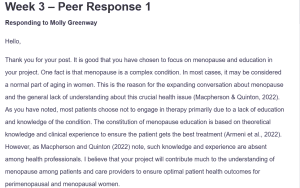Week 3 – Peer Response 1
Responding to Molly Greenway
Hello,
Thank you for your post. It is good that you have chosen to focus on menopause and education in your project. One fact is that menopause is a complex condition. In most cases, it may be considered a normal part of aging in women. This is the reason for the expanding conversation about menopause and the general lack of understanding about this crucial health issue (Macpherson & Quinton, 2022). As you have noted, most patients choose not to engage in therapy primarily due to a lack of education and knowledge of the condition. The constitution of menopause education is based on theoretical knowledge and clinical experience to ensure the patient gets the best treatment (Armeni et al., 2022). However, as Macpherson and Quinton (2022) note, such knowledge and experience are absent among health professionals. I believe that your project will contribute much to the understanding of menopause among patients and care providers to ensure optimal patient health outcomes for perimenopausal and menopausal women.
To add to your project to improve its effectiveness, it is important to understand that education for menopause should go beyond symptom management to focus on understanding how the condition impacts the personal and working life of the individual (Macpherson & Quinton, 2022). Menopause impacts women differently. Experiences with the condition are mostly based on individual factors, including personal history, socioeconomic status, ethnicity, and current health status (Genazzani et al., 2024). Therefore, you need to design your project in a manner that allows the providers to assess symptoms, needs, desires, and risk profiles at an individual level to guide the design of personalized education plans. Therefore, your project will be able to effectively improve the knowledge and ability of patients and care providers to manage menopause.
References
Armeni, E., Mili, N., Siliogka, E., Goulis, D. G., & Lambrinoudaki, I. (2022). Menopause medical education around the world: The way forward to serve women’s health. Current Opinion in Endocrine and Metabolic Research, 26, 100387. https://doi.org/10.1016/J.COEMR.2022.100387
Genazzani, A. R., Divakar, H., Khadilkar, S. S., Monteleone, P., Evangelisti, B., Galal, A. F., Priego, P. I. R., Simoncini, T., Giannini, A., Goba, G., & Benedetto, C. (2024). Counseling in menopausal women: How to address the benefits and risks of menopause hormone therapy. A FIGO position paper. International Journal of Gynecology & Obstetrics, 164(2), 516–530. https://doi.org/10.1002/IJGO.15278
Macpherson, B. E., & Quinton, N. D. (2022). Menopause and healthcare professional education: A scoping review. Maturitas, 166, 89–95. https://doi.org/10.1016/J.MATURITAS.2022.08.009
ORDER A PLAGIARISM-FREE PAPER HERE
We’ll write everything from scratch
Question
PEER RESPONSE 1
BY: Molly Greenway
My capstone project aims to discover the correlation between education and lack of treatment for menopause. Approximately 2 million women per year in the United States enter into menopause (Grant et al., 2024). After obtaining the appropriate data, the project will be able to address the best way to educate perimenopausal and menopausal women on their symptoms and available treatment options available at the OBGYN clinic. According to the World Health Organization (2022), menopause is defined as a lack of menstruation for at least 12 consecutive months due to the loss of ovarian follicular function and a decline in circulating blood estrogen levels and usually occurs between the age of 45-55 years old.
Symptoms associated with menopause in women include hot flashes, vaginal dryness, insomnia, decrease in libido, mood swings, etc (World Health Organization, 2022). The most common treatment offered in OBGYN clinics includes hormone replacement therapy. Estrogen-containing hormone replacement therapy is approved by the FDA and is available in forms such as a transdermal patch, daily pill, or topical cream (Harper-Harrison & Shanahan, 2023).

Week 3 – Peer Response 1
The primary intention of my project is to determine why patients have chosen to not engage in menopause therapy, Theories include social stigmas revolving around menopause, lack of education of the patient, lack of education by the provider, lack of resources/funding within the clinic, and previous treatment experiences. I then intend to take this information and discover the best way to educate patients on menopause and decrease the number of women suffering through their menopausal years.

